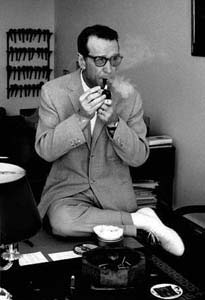Georges Simenon | |
|---|---|
 Simenon in 1963 | |
| Born | Georges Joseph Christian Simenon 12 February 1903 or 13 February 1903 Liège, Wallonia, Belgium |
| Died | 4 September 1989 (aged 86) Lausanne, Romandy, Switzerland |
| Pen name | G. Sim, Monsieur Le Coq |
| Occupation | Novelist |
| Language | French |
| Nationality | Belgian |
| Alma mater | Collège Saint-Louis, Liège |
| Years active | 1919–1981 |
| Notable awards | Académie royale de Belgique (1952) |
Georges Joseph Christian Simenon (French: [ʒɔʁʒ simnɔ̃]; 12/13 February 1903 – 4 September 1989) was a Belgian writer, most famous for his fictional detective Jules Maigret. One of the most popular authors of the 20th century, he published around 400 novels (including 192 under his own name), 21 volumes of memoirs and many short stories, selling over 500 million copies.
Apart from his detective fiction, he achieved critical acclaim for his literary novels which he called romans durs (hard novels). Among his literary admirers were Max Jacob, François Mauriac and André Gide. Gide wrote, “I consider Simenon a great novelist, perhaps the greatest, and the most genuine novelist that we have had in contemporary French literature.”[1]
Born and raised in Liège, Belgium, Simenon lived for extended periods in France (1922–1945), the United States (1946–1955) and finally Switzerland (1957–1989). Much of his work is semi-autobiographical, inspired by his childhood and youth in Liège, extensive travels in Europe and the world, wartime experiences, troubled marriages, and numerous love affairs.
Critics such as John Banville have praised Simenon's novels for their psychological insights and vivid evocation of time and place. Among his most notable works are The Saint-Fiacre Affair (1932), Monsieur Hire's Engagement (1933), Act of Passion (1947), The Snow was Dirty (1948) and The Cat (1967).
- ^ Assouline, Pierre (2013). "VII. À la croisée d'une œuvre: Les écrivains face à Simenon". Cahiers de l'Herne (in French). 102: 221–225.
« Je tiens Simenon pour un grand romancier : le plus grand peut-être et le plus vraiment romancier que nous ayons eu en littérature française aujourd'hui. »